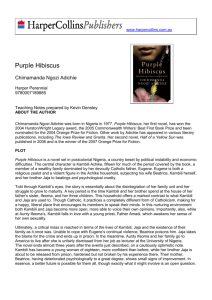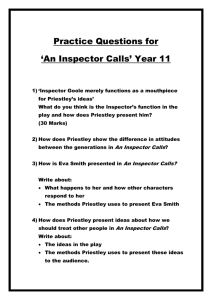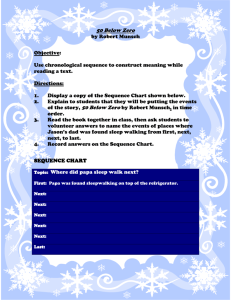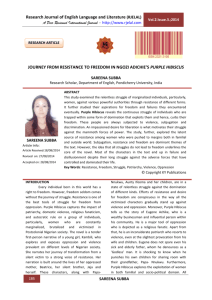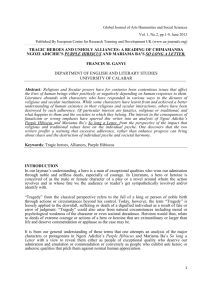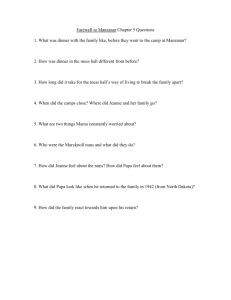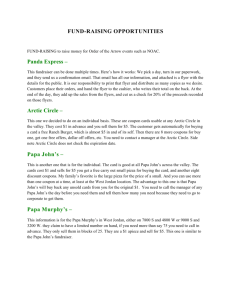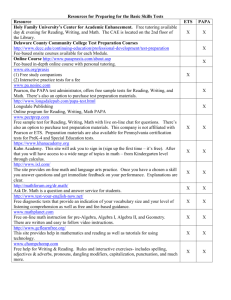Purple Hibiscus - Character quotes
advertisement
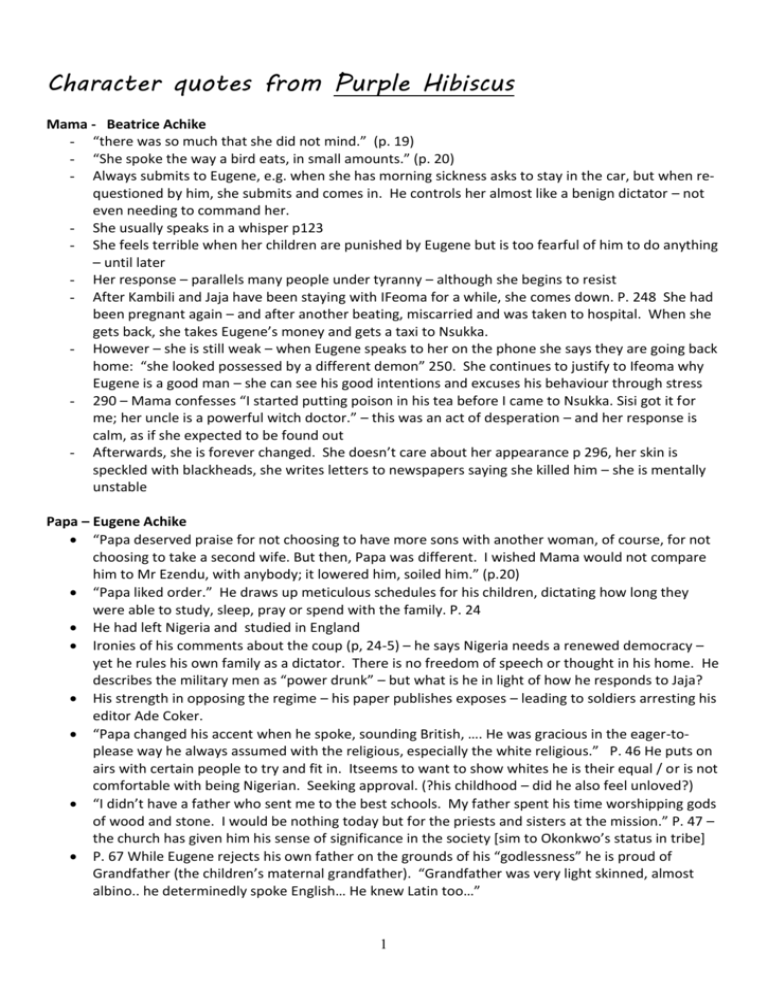
Character quotes from Purple Hibiscus Mama - Beatrice Achike - “there was so much that she did not mind.” (p. 19) - “She spoke the way a bird eats, in small amounts.” (p. 20) - Always submits to Eugene, e.g. when she has morning sickness asks to stay in the car, but when requestioned by him, she submits and comes in. He controls her almost like a benign dictator – not even needing to command her. - She usually speaks in a whisper p123 - She feels terrible when her children are punished by Eugene but is too fearful of him to do anything – until later - Her response – parallels many people under tyranny – although she begins to resist - After Kambili and Jaja have been staying with IFeoma for a while, she comes down. P. 248 She had been pregnant again – and after another beating, miscarried and was taken to hospital. When she gets back, she takes Eugene’s money and gets a taxi to Nsukka. - However – she is still weak – when Eugene speaks to her on the phone she says they are going back home: “she looked possessed by a different demon” 250. She continues to justify to Ifeoma why Eugene is a good man – she can see his good intentions and excuses his behaviour through stress - 290 – Mama confesses “I started putting poison in his tea before I came to Nsukka. Sisi got it for me; her uncle is a powerful witch doctor.” – this was an act of desperation – and her response is calm, as if she expected to be found out - Afterwards, she is forever changed. She doesn’t care about her appearance p 296, her skin is speckled with blackheads, she writes letters to newspapers saying she killed him – she is mentally unstable Papa – Eugene Achike “Papa deserved praise for not choosing to have more sons with another woman, of course, for not choosing to take a second wife. But then, Papa was different. I wished Mama would not compare him to Mr Ezendu, with anybody; it lowered him, soiled him.” (p.20) “Papa liked order.” He draws up meticulous schedules for his children, dictating how long they were able to study, sleep, pray or spend with the family. P. 24 He had left Nigeria and studied in England Ironies of his comments about the coup (p, 24-5) – he says Nigeria needs a renewed democracy – yet he rules his own family as a dictator. There is no freedom of speech or thought in his home. He describes the military men as “power drunk” – but what is he in light of how he responds to Jaja? His strength in opposing the regime – his paper publishes exposes – leading to soldiers arresting his editor Ade Coker. “Papa changed his accent when he spoke, sounding British, …. He was gracious in the eager-toplease way he always assumed with the religious, especially the white religious.” P. 46 He puts on airs with certain people to try and fit in. Itseems to want to show whites he is their equal / or is not comfortable with being Nigerian. Seeking approval. (?his childhood – did he also feel unloved?) “I didn’t have a father who sent me to the best schools. My father spent his time worshipping gods of wood and stone. I would be nothing today but for the priests and sisters at the mission.” P. 47 – the church has given him his sense of significance in the society [sim to Okonkwo’s status in tribe] P. 67 While Eugene rejects his own father on the grounds of his “godlessness” he is proud of Grandfather (the children’s maternal grandfather). “Grandfather was very light skinned, almost albino.. he determinedly spoke English… He knew Latin too…” 1 He is revered in church settings, e g on Christmas day p. 90 “He led the way out of the hall, smiling and waving at the many hands that reached out to grasp his white tunic as if touching him would heal them of an illness.” He is seated with a chief and the Igwe (a King) who later comes and visits him. Amaka is surprised but concludes it must be “because your father is a Big Man.” 93 Ifeoma says p. 95 “ Eugene has to stop doing God’s job. God is big enough to do his own job. If God will judge our father for choosing to follow the way of our ancestors, then let God do the judging, not Eugene.” He lashes out with his belt when he discovers Kambili eating cornflakes before Mass, crying “Has the devil built a tent in my house?”. A complete overreaction. Shows no humanity. But afterwards he seems ashamed although he can’t admit it, asking instead “why do you like sin?” p 102 His own sense of worthlessness seems to drive his behaviour. P. 107: Following confession with Father Benedict, Papa says “I am spotless, we are all spotless. If God calls us, we are going straight to Heaven.” …His eyes were bright.” Papa is quite reluctant to let his children go to Nsukka –but not only because of Ifeoma’s influence. He shows his love and attachment to his children: “I have never been without you two for more than a day” and cries p. 109 Man of principle, refuses to pay bribes to policemen p,111 He controls his childrens lives – daily schedules – even while on holiday When he arrives at Nsukka and is told Papa died, his first words are “Did you call a priest to give him extreme unction?” p. 188 – and he wants to arrange a Catholic funeral – despite knowing his father would be opposed to it After he burns his childrens’ feet he comes to her and says “Everything I do for you, I do for your own good.” P. 196 – sick kind of self justification for his own sense of unworthiness!! He has experienced this punishment at St Gregory’s after masturbation – a priest made him soak his hands in hot water hypocrisy in his actions – given he publishes a story about a democracy activist who is killed – after a gun shot and acid bath p.200 -p 206 When Ade Coker is killed by a bomb, Papa cries. “He seemed so small”. He feels guilty: “I should have protected him.” He organises his funeral, sets up a trust for his wife and children, paid huge staff bonuses and gave them leave. Shows his compassionate side. – However the death has a huge effect on him. “he took longer to reply when spoken to, to chew his food, even to find the right Bible passages to read.” – semi-depression The soliders begin to sabotage his factories – plant dead rats in cartons and close the factory down. After the death of Ade – and he catches K and J looking at the painting – he is taking out his sense of guilt on them – and beats her to a pulp – p211 – leaving her with a broken rib He does lash out during stressful periods of his life. As Amaka observes p 251: “Uncle Eugene is not a bad man, really. People have problems, people make mistakes…. I mean some people can’t deal with stress.” He has changed in the interim to – he has rashes on his face, it “looked swollen, oily, discoloured.” He had lost weight. P. 252 His voice was different, tired. He seemed to give up – (partly the effect of the poison, partly his sense of failure with his family and business?) p 262 – gives into Jaja and lets them go to Nsukka When Kambili hears that her father has died, she is shocked. “He had seemed immortal”. He is like one of the gods- and now he was broken. 287 Kambili Achike Painfully shy, 15 year old girl, living in her father’s shadow 2 Initially is desperate to win father’s approval. E.g. p.26: “God will deliver us.” I said, knowing Papa would like my saying that. ..Then he reached out and held my hand, and I felt my mouth were full of melting sugar.” Only later realises the extent to which she is indoctrinated by her father not to question anything that he does. After her mother’s miscarriage after a beating the family prays for her forgiveness. “I did not even think to think what Mama needed to be forgiven for.” P. 36 Described by her form mistress as “intelligent beyond her years, quiet and responsible.” Principal: “A brilliant, obedient student, a daughter to be proud of.” But Papa would not be proud.” She came 2nd in class and “I was stained by failure.” P. 39: once again this causes a strong physical reaction in Kambili which shows her fear and distress. Her father tells her , “You didn’t put in your best this term. You came second because you chose to.” Next term, she fearfully memorises all her classwork to return to first place. Kambili’s interactions with her classmate and teacher show her to be timid and socially almost paralysed. She is “awkward, tongue tied” and struggles to make conversation . The other girls refer to her as a “backyard snob” and assume she must be so because of her parents wealth. but she is really just shy. She runs off instead of walking to the school gate with the others. P49-51 Her response to adults is similarly timid. She seems to have no sense of her self, her own opinions or feelings. P. 57 When Ade Coker asks her if she and Jaja like coming to their village, they look at their father before answering. Eugene is proud of their quiet obedience, but Ade Coker rightly asks, “Imagine what the Standard would be if we were all quiet.” She feels a connection to her grandfather Papa-Nnukwu, even if it is forbidden by her father. She cannot find signs of “godlessness”, though she tries p. 61. She wants to stay longer with him (“I wanted to stay so if the fufu clung to his throat and choked him I could run and get water.”)p. 66 She admires her aunt Ifeoma: “I watched every movement she made; I could not tear my ears away. It was the fearlessness about her…” She is a young fifteen- especially compared to her bold cousin Amaka who “asked many questions and did not accept many answers” 79 She recites her father’s words without thinking for herself at first. E.g. When Ifeoma wants to pick up Papa N and asks why their father would object, Jaja says “I don’t know” but Kambili says “Because Papa N is a pagan” and thinks ‘Papa would be proud that I had said that.” Kambili has a short lived experience with Aunty Ifeoma – going to see the pagan masquerade This seems to awaken something inside her: “That night, I dreamed I was laughing, but it did not sound like my laughter, although I was not sure what my laughter sounded like. It was cackling and throaty and enthusiastic, like Aunty Ifeoma’s.” 88 After this incident, Kambili begins wondering about more things, e.g. what it would be like to wear lipstick like her cousin Amaka (p..89) during Christmas day mass Visiting her aunts family in Nsukka: Kambili is observant of all the ways her aunt’s family is so different from her own. She is frightened and unsure of how to behave. She has to contend with Amaka’s assumption that she thinks Nsukka is “uncivilised compared to Enugu” Her timidity is shown by her voice: Amaka notices she talks in whispers p117 She follows Amaka with “frightened footsteps” She is sensitive, “I wished that [Amaka] woulf not keep looking at me as if I were a strange laboratory animal to be explained and catalogued.” She is very conscious of her new environment in Nsukka: “..I was observing a table where you could say anything at any time to anyone, where the air was free for you to breathe as you wished.” 120 Observing the way her aunt and cousins do the rosary – singing – is an experience for Kambili – another moment to question the status quo at home However, breaking a number of rules is disturbing and difficult for her (eg abandoning the schedule, watching TV) – she says “I felt as if my shadow were visiting Aunty Ifeoma and her family, while the 3 real me was studying in my room in Enugu, my schedule posted above me.” 125 – that night she has a nightmare of being flushed in a toilet by Amaka – sense of guilt, lack of purity During the visit to the Uni, Ifeoma suggests K may go there with A – but K acknowledges “I had never thought about the university, where I would go or what I would study. When the time came, Papa would decide.” Meeting Father Amadi has an immediate effect on Kambili. She is attracted to this “handsome priest” (137) : “I wanted some of the cloudlike warmth in Father Amadi’s eyes to rub off on me” She feels paralysed in his presence: “I could not move my tongue, could not swallow. I was too aware of his eyes, too aware that he was looking at me, watching me.” When he speaks to her, she wants to say sorry that she did not smile or laugh, “but my words would not come, and for a while even my ears could hear nothing.” 139 With Amaka’s friends or the neighbourhood children – she is not able to speak or answer their questions, she freezes up p 143 The more differences she notices at Ifeoma’s e.g. Amadi, the prayer for Pape Nnukwu, laughter, freedom – she begins to internally question for the first time. Asks Jaja “Do you think we’re abnormal?” p.151 Cuts her nails to a “chafing shortness”following Papa. Self-abasement? Notices Jaja has begun to change (before her) – he tells Ifeoma about his finger She envies the relationship between her cousin and grandfather: “Amaka and Papa Nnukwy spoke sometimes, their voices low, twining together.” Her aunt begins to address some of the ideas Kambili has grown up with, e.g. around Papa N and his religious practice – but K is not yet ready to fully understand When Kambili sees Papa N talk to ancestors –she is able to make connections to her own saying of the Rosary and see him as a person just as worthy as herself. P168 Turning point in novel – Amaka once again makes a smart comment about Kambili’s ignorance of food prep because she is rich – Aunty Ifeoma suddenly says “O ginidi, Kambili, have you no mouth? Talk back to her!”. After a pause, she says “You don’t have to shout, Amaka. …I dpn’t know hot to do the orah leaves, but you can show me.” She speaks calmly…and makes Amaka laugh. 170 Kambili – borrows shorts and goes out with Amadi. She is attracted to him and feels guilty in the car with him where his shorts expose his muscular knee andshe smells his cologne. Unable to make normal conversation she makes a confession – “I sleepin the same room as my grandfather. He is a heathen.” Amadi helps to gently question her, “Why is it a sin?” and she realises she doesn’t know. P175 Amadi tells her she has “good legs for running”- an intimacy which makes her embarrassed. “Don’t you know how to smile?” he asks. But “I wanted to smile but I could not. My lips and cheeks were frozen.” He sees that she tried on lipstick for the first time. Amadi observes, “you haven’t asked me a single question” 179. She says “I don’t know what to ask.” Then..she laughs for the first time – “It sounded strange, as if I were listening to the recorded laughter of a stranger being played back. I was not sure I had ever heard myself laugh.” At home after that: she is full of the excitement of being with him. “Didn’t he know that I did not want him to leave, ever? … The afternoon played across my mind… I had smiled, run, laughed. My chest was filled with something like bath foam. Light. The lightness was so sweet I tasted it on my tongue..” 180 When Aunty mentions her father has called, K has a physical reaction of fear – “my head was filling up quickly with blood or water or sweat.” That night she has a nightmare of Papa in a rage. The next morning, Papa N is dead. On return to Enugu, she is punished for “walking into sin” by having hot water poured onto her bare feet. P. 194 Still has a crush on Father Amadi – doodles his name, “sees” him everywhere p 204. She has begun to change. “I joined the group of girls on the volleyball field on the second day of school. I did not 4 hear the whispers of ‘backyard snob’…. I stood waiting with my hands clasped until I was picked. I saw only Father Amadi’s clay-coloured face and heard only ‘you have good legs for running” – he has given her self confidence Later when she and Jaja are looking at the painting of Papa N – it is like she watns to be caught by her father p. 209 “Perhaps it was what we wanted to happen…without being aware of it. Perhaps we all chanted after Nsukka – even Papa – and things were destined not to be the same, to not be in their original order.” She owns up to bringing the painting back and suffers a violent beating after refusing to let go of the painting. But she blocks it out and thinks of Amaka’s music. She does not accept guilt – mental opposition. p210 P. 212 – her beating is so severe she receives extreme unction from Father Benedict. She does not respond to her father and feels mixed emotions towards her mother: “I wished I could get up and hug her, and yet I wanted to push her away, to shove her so hard that she would topple over the chair.” P 213 She asks for Aunty Ifeoma, who comes with Father AMadi. She speaks directly to Mama – “When a house is on fire, you run out before the roof collapses on your head.”213. She insists K & J will come with her once she is out of hospital and Mama is to follow. She receives tutoring, and still comes 1st in class. Her classmates visit and wish her get well. This is another important moment for K – receiving the approval from her peers she has always wished for. 215 She admits to AMaka she has a crush on Father Amadi and learns that he also cares deeply for her. “More than priestly concern” says Amaka, “he sounded like a person whose wife was sick.” 220 When he visits and she hugs him it is “tense and delicious” During this visit she is far more conscious of the differences – as she watches Father AMadi encouraging the boys with the high jump, she observes “It was what Aunty Ifeoma did to my cousins… setting higher and higher jumps for them in the way she talked to them, in what she expected of them. …It was different for Jaja and me. We did not scale the rod because we believed we could, we scaled it because we were terrified that we couldn’t.” 226 After Amadi takes her to have her hair plaited, he encourages her to try out for the part of Our Lady in the play. He tells her “You can do anything you want, Kambili.” P.239 She observes all the changes in her father, Jaja, her mother and herself. When she is at Nsukka on Easter Sunday she helps Amaka prepare the garri – and she is proud of her independence: p. 264. P. 266 – she dares to disagree and joke with Amaka – “You’re funny,” “I had never heard that before. I saved it for later, to ruminate over and over that I had made her laugh, that I could make her laugh.” With Father Amadi, she admits she is thinking about her father. She doesn’t know what will happen when they go back p. 268. He called and neither she or Jaja spoke to him – although she wanted to. She feels divided – confused – by her love for her father, and her desire to escape him. “I did want to talk to Papa, to hear his voice, to tell him what I had eaten and what I had prayed for so that he would approve… and yet, I did not want to talk to hi; I wanted to leave with Father Amadi, or with Aunty Ifeoma, and never come back.” 268 Amadi says to Kambili “What you think will always matter to me, Kambili”. He makes her feel valued and loved. He values her opinion. That night in the bath “I sang as I bathed” 270 – new joy, new sense of peace and wholeness and self They go on a pilgrimage to Aopke to see the apparition of the Virgin p. 274 – Kambili has a religious experience. “The ribbons that cordoned off the apparition area shook, Yet there was no wind. The sun turned white, the colour and shape of the host. And then I saw her, the blessed Virgin: an image in the pale sun, a red glow on the back of my hand… she was everywhere.” This compares to 5 Jaja Amadi’s assertion that he sees Christ in the faces of the children – it almost has more to do with the faith of the believer? On the way home, she sings Igbo chorus songs. Later she finds the courage to say “I love you” to Father Amadi. (Huge progress for a girl who never spoke!!) He says “You are beautiful. You will find more love than you will need in a lifetime." When her mother confesses, she reacts violently – “Why in his tea?” – thinking of the love sips. Did her mother care if she also harmed the children? She listens and sings along to Fela – like her cousin She goes back to Nsukka to visit the new family in Ifeoma’s flat and laughs loudly on the way back 299: “Because Nsukka could free something deep inside your belly that would rise up to your throat and come out as a freedom song. As laughter.” She carries around Amadi’s letters around. “They are long and detailed, because they remind me of my worthiness.” He helps her to reflect on what has happened to her. “he wrote that he did not want me to seek the whys.” P.303: “I no longer wonder if I have a right to love Father AMadi; I simply go ahead and love him.” When she visits Jaja to tell him he is getting out of prison she says “his eyes are too full of guilt to really see me, to see his reflection in my eyes, the reflection of my hero, the brother who tried always to protect me the best he could.” He is Kambili’s ally at home – they miss not being able to eat lunch together when they go to different schools. They communicate wordlessly following events such as their father’s abuse Jaja – takes the blame for staying later at Papa Nnukwu’s p. 69 – prefigures his action at the end of the book. Second time he takes the blame – is for his mother who has allowed Kambili to break fast before Mass because she has to take a panadol for her cramps p. 102 He is a responsible, caring boy who is more perceptive than Kambili at first (e.g. says “he hides it well” about Papa N not minding about his son’s treatment.) He has also suffered physical cruelty under his father’s wrath p 145 “when he was ten and missed two questions on his catechism test…” – he lost the use of one finger on his left hand He is older than Kambili and more ready to experience and appreciate Ifeoma’s new ways. P. 147 – very happy about staying longer After the week with Ifeoma “his shoulders seemed broader..” – he comes of age and begins to think more independently – he matures. Takes initiative to wash her car – and she calls him “nna m” (my father) a term she only used on her sons previously When he comes home and his father talks about Papa N converting he dares to say “Maybe he didn’t want to convert”. Then, during dinner he asks for the key to his room. Papa immediately assumes he wants to masturbate. He takes stalks of the purple hibiscus p197 and hides them secretly in the fridge ; “Jaja’s eyes shone as he talked about the hibiscuses..” – this is the hope and promise of freedom… Jaja offers to kill the chicken (another sign of his “manhood”?). He declares that he wants to go with Aunty Ifeoma if she leaves. P. 235. Leaving the family home – another stage of coming of age Jaja becomes very strong – this is evident from his Palm Sunday rebellion – not going to communion. However, after – when he hears that Ifeoma has been fired and Father Amadi is going to Germany – he takes charge and says “We are going to Nsukka. Kambili and I” to his father. At this point, it is as though Eugene has given up fighting –and lets them go. 261 He chooses not to go on the pilgrimage to Aopke – it seems he has rejected religion He expresses doubt about Christianity to Kambili 289 6 He immediately takes the blame for the poison when the police come to ask questions following the autopsy 291 He goes to prison and suffers a lot. “Those shoulders that bloomed in Nsukka, that grew wide and capable, have sagged in the thirty-one months that he has been here.” On their last visit before he gets out of prison she says “his eyes are too full of guilt to really see me, to see his reflection in my eyes, the reflection of my hero, the brother who tried always to protect me the best he could.” She still dreams of her father – of hugging him, but also of the fear p. 306 – suggests she will never be free Her final words to her mother are full of hope, optimism and confidence – the voice of a young woman with dreams, no longer a frightened girl. “We’ll take Jaja to Nsukka... then go to America to visit Aunty Ifeoma, plant new orange trees in Abba… and Jaja will plant purple hibiscuses, too and I’ll plant ixora so we can suck the juices of the flowers”. P.306. She is laughing, and he mother smiles. Her final words are “The new rains will come down soon.” 7 Aunt Ifeoma Mama asks “What is a woman with children and no husband?” – Ifeoma answers “Sometimes life begins when marriage ends.” These words resonate later in the book after the death of Eugene. Ifeoma is almost the opposite to Eugene –she is playful, lighthearted, free. As a university lecturer of African Studies she has liberal, feminist views. She talks about her female students marrying early and “when they graduate, their husbands own them and their degrees” p. 75. In contrast to Mama, who says “a husband crowns a woman’s life.” Kambili describes her as fearless p, 76 . She has an expansive personality – gestures and smiles when she speaks in contrast to the severity of Eugene She dares to be “flippant” with him unlike anyone else Her eyes have “unconditional warmth” p. 95 “Her whisper was like her – tall, exuberant, fearless, loud, larger than life.” She is gutsy and proud. Although Eugene has offered to buy her a car if she does a range of things to please him, she refuses. She prays for ‘peace and laughter’ to Kambili’s surprise Unlike her daughter she is gracious and understanding of the children, helping to liberate them from the controlling presence of their father. She insists Amaka treats K with respect p141 She comes to visit Kambili in hospital and immediately offers to take her and bro, mother in – she acts her faith out Aunty Ifeoma p 222 learns of a list of disloyal lecturers who may lose their jobs, she is not afraid. “I am not paid to be loyal. When I speak the truth it becomes disloyalty.” When do we speak out, eh? When soldiers are appointed lecturers and students attend lectures with guns to their heads?” She is not so “loose” that she never disciplines her children – p245 – she punishes Obiora for being disrespectful to her friend Amaka & Obiora She assumes Kambili is stuck up because she is wealthy and doesn’t speak much. She feels superior to Kambili because she needs to show she isn’t impressed by the family’s wealth pp116-120 She is bold, confident, self-assured P. 118 “I listen mostly to indigenous musicians. They’re culturally conscious; they have something real to say.” …She said ‘culturall conscious’ in the proud way that people say a word they never knew they would learn until they do.” She constantly mocks Kambili – for schedule, for asking to go to the toilet, for not understanding how to flush it, for her meekness, for not knowing how to peel a yam Amaka asks her mother “Are you sure they are not abnormal?”141 Both she and her 14 year old bro Obiora, her brother are far more sophisticated and wordly than Jaja and Kambili – p.132 – K is surprised by Obiora’s statement about corruption Obiora – after another political outburst, K says “He was a bold, male vertsion of what I could never have been at fourteen, what I still was not.” Obiora is articulate and politically informed – able to discuss “religion and oppression” 173 AMaka begins to respect Kambili more once Kambili stands up to her p173 P.190 after Papa N’s death when K leaves, Amaka gives her the unfinished painting of him Amaki is kind to Kambili when she returns to Nsukka for the second time. P219 – she tells her “You have become Father Amadi’s sweetheart. He was really worried about you when you were sick.” Her feelings intensify into sexual feelings when she is alone with Amadi at the stadium again.p227 It seems like Ifeoma has told her about Kambili’s abuse – from her reaction after Obiora is punished 246 8 Father Amadi So different from Father Benedict, popular and loved in the area He is a “boyish man” dressed in “an open neck T-shirt and jeans” He speaks in “English laced Igbo” He is the priest that visited St Agnes and sung during the mass and upset Kambili’s father He is observant, kind, sensitive. Notices K and J. After first meeting says, “I haven’t seen you laugh or smile today, Kambili.” He plays football to Kambili’s surprise He is compassionate – offers the chaplaincy’s emergency supply of gas so Ifeoma can go and pick up Papa Nnukwu He wears a soutane, longsleeved and loose-fitting, He has a “loping comfortable gait”. P. 163 Notices that although Kambili doesn’t speak much “there is a lot going on in her mind.” 173 and offers to take her out with him to the stadium He is full of love for his people – is a more Christ like model than Eugene. He says to K, “I see Christ in their faces, in the boys faces” speaking of the impoverished boys he played football with There is a sense that he has feelings for Kambili too – p227 : “Father AMadi ran his hand over the loosening braids, in gentle smoothing motions. He was looking right into my eyes. He was too close... I wanted to collapse into him”. Amaka refers to Kambili as his sweetheart, and Mama Joe (237) says to K: “Do you see the way he looks at you? It means something I tell you.” “A man does not bring a young girl to dress her hair unless he loves that young girl, I am telling you.” 238 He suggests she is the ‘prettiest girl’ in a comment p. 239 His church St Peters is run very differently from St Agnes p242 – less rules, more integration of Igbo songs He is called to be a missionary in Germany – He says to Kambili “What you think will always matter to me, Kambili”. He makes her feel valued and loved. He values her opinion. 9 THEMES Freedom P. 42: After Ade Coker returns after his arrest by soldiers he writes about the value of freedom, “how his pen would not, could not, stop writing the truth.” Ade acknowledges Eugene, as a “man of integrity, the bravest man I know.” It is ironic that Eugene as his publisher supports political freedom yet limits the freedom of his family so harshly. He cared about his staff so much he made the newspaper publish from a secret location. Eugene is proud of his childrens’ quiet obedience, but Ade Coker rightly asks, “Imagine what the Standard would be if we were all quiet.” P. 57 In contrast – Obiora and Amaka (Ifeoma’s children) show their relative freedom in their loud laughter “throaty, cackling sounds pushed out with enthusiasm” (78) Ifeoma tells Jaja: “Defiance is like marijuana – it is not a bad thing when it is used right” 14 P. 146 – destruction of the newspaper office by soldiers – breaking down in the outside world.: “The soldiers took every copy of the entire print tun, smashed furniture and printers, locked the offices, took the keys and boarded up the doors and windows.” – destroying freedom of speech Ifeoma, her children and Father Amadi’s lifestyles are profoundly free in contrast to Eugene’s tightly regimented schedules and strict religious observance which leaves no time for fun or relaxation P. 199 – When Nwankiti Ogechi – a pro democracy activist disappears and the Standard runs a story on him – the regime of Big Oga wants them to cancel it and try to bribe them with an interview. The story tells how he is shot and has acid poured on his body. (parallel with Papa’s punishment of hot water) Government agents try to bribe Papa with a “truckful of dollars” but he asks them to leave the house 200 Consequences of fighting for freedom – danger – democratic coalition come to warn Papa to be careful p 201 P223 – the sole administrator is not voted by Uni staff – another sign of government interfering and restricting freedoms. Ifeoma is defiant. Later students chant and sing “Sole administrator must go” – and university is closed down 228 Then a special security unit turns up to search Ifeoma’s house p231 –but are really trying to scare her P232 – dilemma of what to do – Obiora favours leaving, moving to America; but Amaka says that running away is not the answer Chiaku says: (in response to Ifeoma’s plan to go to USA) - “The educated ones leave, the ones with the potential to right the wrongs. They leave the weak behind. The tyrants continue to reign because the weak cannot resist. …Who will break that cycle?” p. 245 Kambili goes back to Nsukka to visit the new family in Ifeoma’s flat and laughs loudly on the way back 299: “Because Nsukka could free something deep inside your belly that would rise up to your throat and come out as a freedom song. AS laughter.” University of Nsukka’s motto is “To Restore the Dignity of Man” p112 P132 – Jaja laughs and says “But when did man lose his dignity?” – the implicit answer to that seems to be during colonialism – as it instilled a sense of unworthiness in Nigerian traditions and culture and imposed Western ways as superior. Patriarchal society p. 93 Custom of women “bending low and offering her back so that he would pat it with his fan made of the soft tail of an animal” p.93 10 Story of Jaja of Opobo (who Ifeoma suggests could be a good namesake for Jaja) - known as the stubborn king, or defiant king - King of Opobo people - During colonialism - Refused to let British control all the trade - “He did not sell his soul for a bit of gunpowder like the other kings did” - Exiled in West Indies, never returned - However – as Obiora points out – he sold his people into slavery, and in any case the British won in the end. - Jaja himself says “The British won many wars but they lost many battles”. Story of Tortoise and Dog - Papa Nnukwu tells this folk story. Possibly a reference to colonialism – is tortoise the Nigerian who is lured to “heaven” to eat and drink with Dog (white man’s) wealthy ancestors – only to be dropped on his shell (??) Post-colonial issues - Papa’s insistence on speaking English and his denigration of Igbo singing in church - The way Kambili thinks of Jesus as white skinned - Aunty Ifeoma’s friend talks about their friend Philippa teaching in America as a “second class citizen” p. 244, and says “All my years at Cambridge, I was a monkey who had developed the ability to reason.” “The educated ones leave, the ones with the potential to right the wrongs. They leave the weak behind. The tyrants continue to reign because the weak cannot resist. …Who will break that cycle?” p. 245 Self determination – Ifeoma writes in her letter p301 “There are people who think we cannot rule ourselves because the few times we tried, we failed, as if all the other who rule themselves today got it right the first time.” Life is not all easy in America despite some advantages. “Sure there has never been a power outage and hot water runs fro the tap, but we don’t laugh anymore, because we don’t even see each other.” 301 – contrast between Nigerian communal lifestyle v. individualistic culture of USA Reference: Esther Graham - AGGS 11
